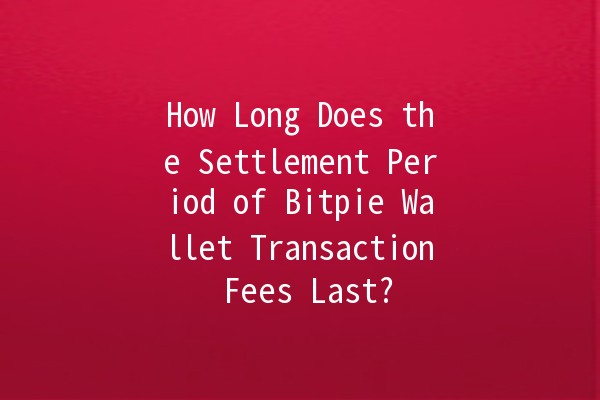
When it comes to cryptocurrencies and digital wallets, one of the most common concerns among users is the transaction fees associated with transfers, deposits, and withdrawals. For Bitpie Wallet users, understanding how long the settlement period for these transaction fees lasts is crucial for effective financial management. This article delves into the details of Bitpie wallet transaction fees, how they work, and offers practical tips for enhancing productivity in managing cryptocurrency transactions.
Understanding Bitpie Wallet
Bitpie Wallet is a versatile digital wallet that supports various cryptocurrencies, making it a popular choice among traders and investors. It offers features such as multicurrency support, highlevel security, and userfriendly interfaces. However, like any wallet, it incurs transaction fees whenever a transfer is made. Knowing the details about these fees and their settlement periods can help users plan their transactions better.
Transaction fees are payments made to miners or validators on the blockchain for processing transactions. These fees serve as an incentive for them to include transactions in the next block. For Bitpie Wallet users, transaction fees can vary based on network conditions, the type of transaction, and the cryptocurrency used.
Example:
For instance, a user conducting a Bitcoin transaction may face higher fees during peak times due to network congestion. Understanding this can help users choose optimal times for transactions, potentially saving them money.

The settlement period for transaction fees in Bitpie Wallet generally refers to the time it takes for a transaction fee to be finalized and recorded on the blockchain. This can vary based on several factors:
Network Speed: Different blockchains have different speeds in processing transactions. Bitcoin, for example, typically takes around 10 minutes per block.
Fee Amount: Higher fees can lead to faster processing times. Users can often choose to increase their fees to expedite transactions.
Network Congestion: During periods of high activity, settlement times can be prolonged.
Generally, for cryptocurrencies like Bitcoin or Ethereum, users might expect a settlement period ranging from a few minutes to a couple of hours, depending on the factors mentioned above.
A. Network Congestion
When a network is busy, transactions may take longer to settle. During such times, users might opt for higher fees to ensure their transactions are prioritized.
B. Transaction Size
Larger transactions with multiple inputs can take longer to confirm. Understanding your transaction size can help you gauge the possible settlement time.
C. Selected Fee Rate
Most wallets, including Bitpie wallet, allow users to select their transaction fee rates. It's crucial to choose a fee that balances your urgency with cost.
Monitoring the fees associated with transactions can lead to better decisionmaking. Here are some tips to enhance your productivity when using Bitpie Wallet:
Tip 1: Schedule Transactions
Plan your transactions during offpeak hours to avoid high fees. Use tools that track network congestion trends.
Example: If you're aware that Ethereum transactions are usually cheaper during latenight hours, schedule your trades at that time.
Tip 2: Set Fee Alerts
Some wallets allow users to set alerts for significant fee changes. This can help in deciding when to proceed with a transaction.
Example: If your wallet notifies you that transaction fees are low, it might be a good time to transfer funds.
Tip 3: Utilize Advanced Settings
Explore advanced settings in Bitpie Wallet to customize your fee preferences based on transaction urgency.
Example: If you're making a timesensitive trade, increase your fee to ensure quick processing.
Tip 4: Learn About Fee Estimation Tools
Familiarize yourself with fee estimation tools available online. These can provide insights into optimal fee rates for various times and network conditions.
Example: Websites that offer realtime fee suggestions can guide your decisions for when to send transactions with the lowest fees.
Tip 5: Avoid Unnecessary Transactions
Minimize the number of transactions to reduce the overall fees you pay. For instance, consider consolidating smaller amounts into fewer larger transactions.
Example: Instead of transferring small amounts multiple times, consider combining your funds into a single transaction to save on fees.
Frequently Asked Questions
You can check transaction fees by reviewing the transaction history or within the settings before making a transfer. The wallet provides estimates based on current network conditions.
No, Bitpie Wallet does not have fixed fees. They vary based on the cryptocurrency being transacted and network conditions.
Several factors can affect transaction speed, including network congestion, the selected fee rate, and the transaction size. Monitor the network's status for better insights.
Most wallets do not allow for fee adjustment once a transaction is submitted. It's essential to select the appropriate fee before confirming the transaction.
Bitpie Wallet uses advanced encryption and security measures to protect user funds and transaction data from unauthorized access.
Yes, various online tools and Bitpie's builtin features can help you estimate future fees based on current trends and historical data.
Understanding the dynamics of transaction fees and their settlement periods is essential for managing your finances effectively on the Bitpie Wallet. By employing strategic techniques and continually monitoring state and fees, you can optimize your cryptocurrency transaction experiences.

